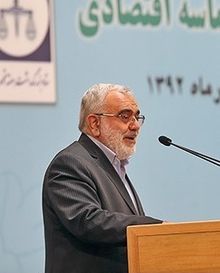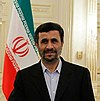Morteza Bakhtiari
Morteza Bakhtiari | |
|---|---|
 | |
| Minister of Justice | |
| In office 3 September 2009 – 15 August 2013 | |
| President | Mahmoud Ahmedinejad |
| Preceded by | Gholam Hossein Elham |
| Succeeded by | Mostafa Pourmohammadi |
| Personal details | |
| Born | 1952 (age 71–72) Mashhad, Iran |
Morteza Bakhtiari (born 1952) is an Iranian politician who was the minister of justice from 2009 to 2013.
Early life
Bakhtiari was born in Mashhad in 1952.[1]
Career
Bakhtiari served as the director of the state prisons organization of Iran from 4 March 1999 to June 2004.[2] He was named as the head of the justice department of the Khorasan Province in Mashhad in June 2004, replacing Ali Akbar Yasaqi.[3][4] Then he began to serve as the governor of Isfahan in October 2005.[5][6] He was approved by the Majlis as justice minister to the cabinet led by president Mahmoud Ahmedinejad on 3 September 2009[7][8] and replaced Gholam Hossein Elham as justice minister.[9][10] Bakhtiari won 225 votes in favor and 36 votes against.[11] 23 members of the Majlis did not attend the session.[11]
Bakhtiari was one of seven members of the committee that was tasked with carrying out the presidential elections held in June 2013.[12] His term as justice minister ended on 15 August 2013 and he was replaced by Mostafa Pourmohammadi.[13]
Sanctions
The European Union put sanctions on Bakhtiari and other two ministers in the form of a visa ban and asset freeze in October 2011 due to alleged human rights abuses.[14] The Treasury of the United Kingdom also put him among asset freeze targets in October 2011 due to the same reason.[15]
References
- ^ "Verordnung" (PDF). Liechtensteinisches Landesgesetzblatt. 18 October 2011. Retrieved 21 January 2013.
- ^ "Iranian paper examines problems awaiting new prisons chief". BBC Monitoring International Reports. 12 June 2004. Retrieved 8 March 2013.
- ^ "Larijani and Ahmadinejad to shuffle ministers". Etemad-e Melli. 19 August 2009. Retrieved 8 March 2013.
- ^ "New Iranian head of prisons appointed". BBC Monitoring International Reports. 6 June 2004. Retrieved 8 March 2013.
- ^ "Sayyed Morteza Bakhtiari". UK for Iranian. Retrieved 21 January 2013.
- ^ "Iranian government appoints four new provincial governors". BBC Monitoring International Reports. 9 October 2005. Retrieved 8 March 2013.
- ^ "List of Iran's new cabinet ministers". Xinhua. Tehran. 3 September 2009. Retrieved 21 January 2013.
- ^ "Chiefs of State and Cabinet Members of Foreign Governments". CIA. 11 June 2012. Retrieved 22 February 2013.
- ^ "Iran's Bar Association: Trying to Stay Independent, Open to Western Help". Wikileaks. 15 January 2010. Retrieved 21 January 2013.
- ^ Alizadeh, Hossein (16 August 2011). "The Best Government from Constitutional Revolution to Date!". Iran Briefing. Retrieved 28 July 2013.
- ^ a b Shoaei, Hanif (2 September 2009). "Iran's Parliament approves a hard-line Cabinet in Tehran". Demotix. Retrieved 28 June 2013.
- ^ Karami, Arash (2 May 2013). "Iran's Minister of Intelligence Attacks Rafsanjani". Al Monitor. Retrieved 19 June 2013.
- ^ "Iranian Parliament Gives Vote of Confidence to Majority of Rouhani's Proposed Ministers". Fars News. 15 August 2013. Retrieved 15 August 2013.
- ^ "Iran criticises fresh EU sanctions targeting ministers". Iran Focus. 11 October 2011. Retrieved 21 January 2013.
- ^ "Asset Freeze Targets". HM Treasury. 29 March 2012. Retrieved 21 January 2013.


